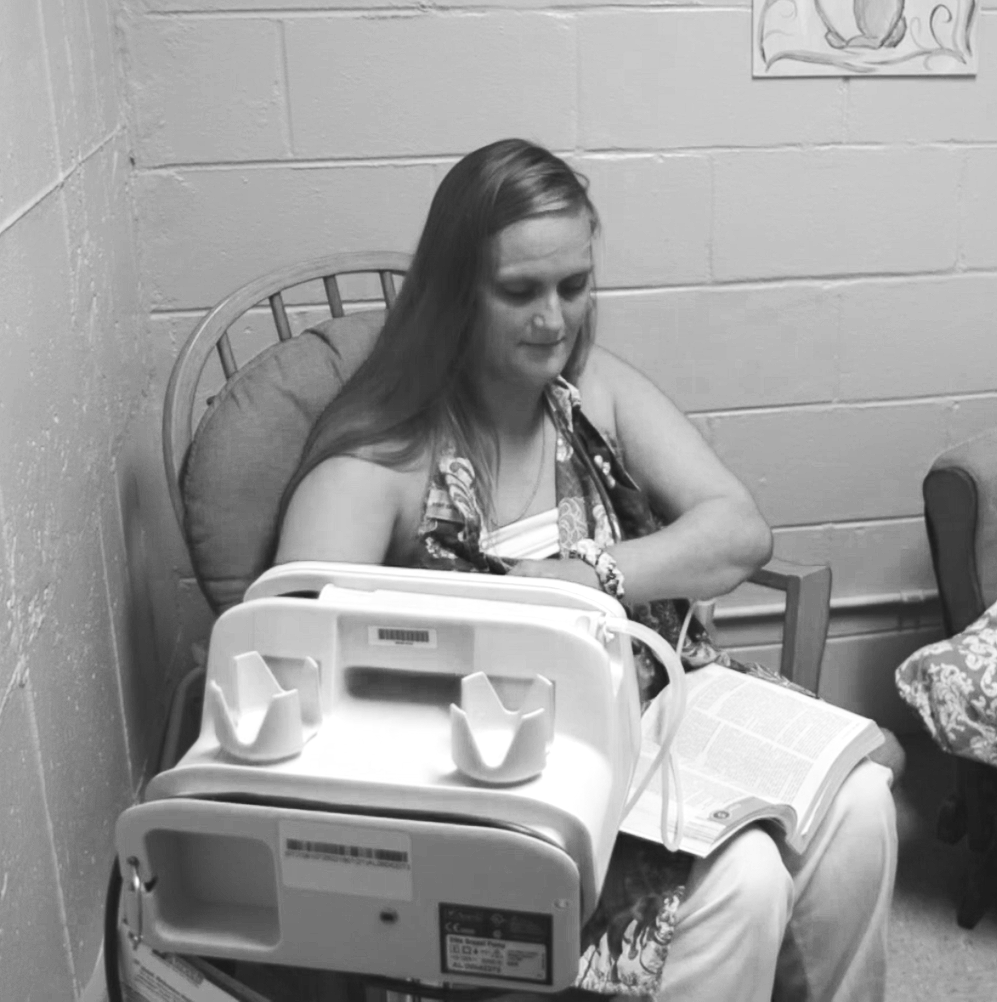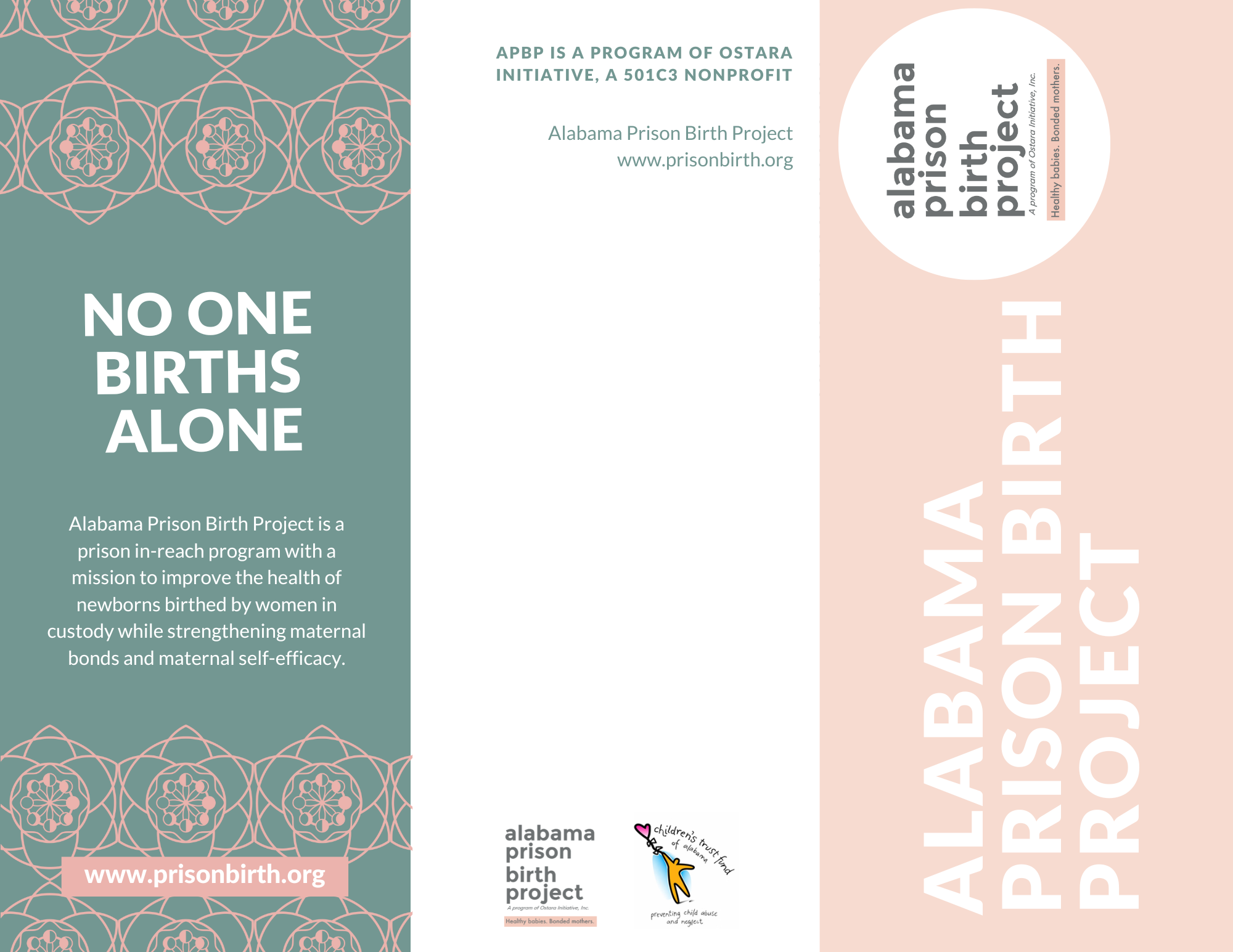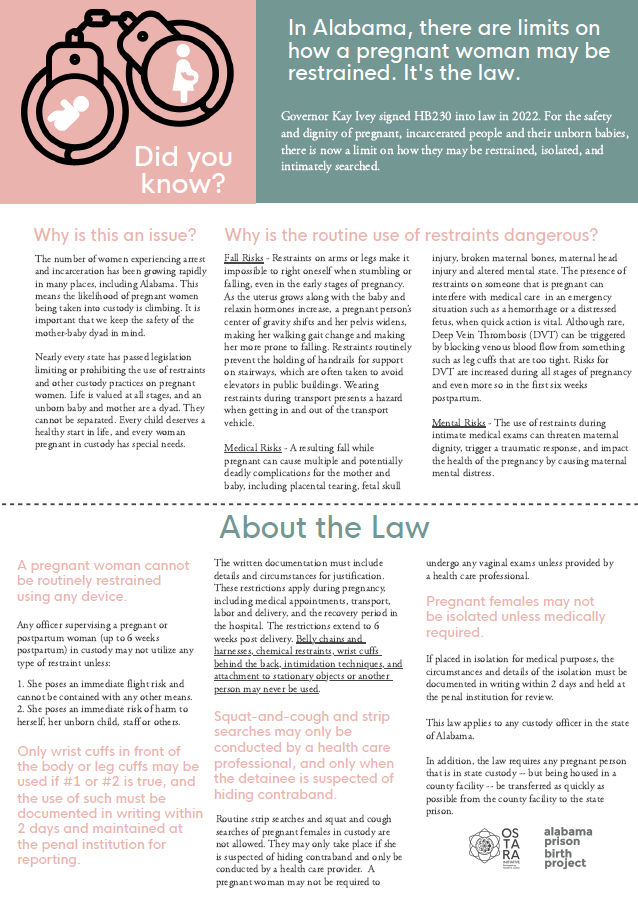We focus on prison birth support for mothers and newborns in Alabama
How we help
Our program and others like it have shown marked decreases in cesarean rates and postpartum depression, increased health of babies and mothers, and increased bonding between the mother-infant pair when imprisoned mothers are accompanied through pregnancy, birth, and separation by a doula. These positive outcomes lower the overall maternity and child care costs for taxpayers.
Our services flow from this vision
We aim to promote newborn health & positive maternal change
It’s our mission to offer care to all birth mothers and their babies in Alabama’s women’s prison. With the help of our partners, we provide the following services and more:
Birth to postpartum full doula support
-
Alabama Prison Birth Project provides one-on-one, peer support to expectant mothers and birth-givers imprisoned in Alabama. By continuously nurturing them through their pregnancy and birthing time, modeling healthy relationships for them, validating their experience by reflecting back their feelings, and holding space around them as they welcome and separate from their newborns, we hope to encourage a continued connection between them and their babies. This connection is key to healthy infant outcomes, healthy infant development, and increased mental well-being and connection for the parent. Data have shown lower cesarean rates, lower risks of infants going to special care nursery, lower preterm birth rates, and higher breastfeeding rates when birth-givers are accompanied by a companion during pregnancy and in the birth room. Click here to watch a video explaining what a doula, or birth companion, is.
Client-centered education groups
-
We lead weekly prenatal and postpartum support and parenting education groups. These 120-minute classes facilitated by APBP teach incarcerated pregnant people about bonding with their infant before and immediately after birth, lactation, early infant development, and parenting. The classes, in addition to increasing our participants' maternity knowledge and skills, also provide an essential forum for community-building and social support. Each participant receives a composition notebook for journaling, teaching handouts, coloring sheets, and a pregnancy and beyond curriculum and a resource book for incarcerated mothers. Both of the latter items are available for purchase on Lulu.com. APBP also stocks the prison library with pregnancy and parenting books and provides baby name books at each group meeting.
-
With the help of food partners, we join clients together and serve a weekly nutritious meal. We have gained special permission from Tutwiler to bring in a nutrient dense spread containing fruits, vegetables, proteins, calcium, Omega-3's, folate, and iron—an important intervention in improving the health of the developing fetus and the birth-giver, both prenatally and during lactation.
Breastmilk pumping through our lactation program
-
New mothers inside Tutwiler, if they wish and are healthy, are able to express milk for their infants once they return to prison after giving birth. Their infants can benefit from the increased maternal connection to them as well as from the developmental, digestive, and immunological properties of the milk. Premature babies, who are more often born to incarcerated mothers, especially need human milk. It can mean the difference between life and death. We overnight the milk on dry ice to the infant's caregiver. With this option, our clients can provide a form of everyday care, even as someone else cares for the baby.
In 2016, a published review of multiple evaluations of perinatal programs in prison indicated lower recidivism rates when pregnant mothers receive prenatal, birth, and postpartum services, including no separation between mother and baby.
Our Clients’
Voices
APBP Client’s Words
“This group is still helping me get through postpartum depression.”
APBP Client’s Words
“Every group, I look forward to sharing my story and helping the new women coming in.”
APBP Client’s Words
“We don’t want to have to go through this alone.”
APBP Client’s Words
“I may be an inmate, but I still have the right to privacy and dignity.”
FAQs about our prison birth work
-
Doulas are hired by birth mothers/couples to provide continuous support during pregnancy, all of the labor and delivery process, and in the first few days postpartum.
Doulas are not medically-trained and perform no medical procedures. They are strictly present to offer nurturing and emotional support, along with physical support, to the birthing mother. Because women in custody are not allowed any familiar support in the birth room, a doula who supports an incarcerated mother can help her through the process of giving birth and preparing to separate fromher infant.
-
We are currently taking part in a multi-site study evaluating outcomes of pregnancy programming in prisons in partnership with Dr. Rebecca Shlafer at the University of Minnesota. Until recently, data from these types of prison programs were not systematically collected. However, research has shown that programs like ours are highly beneficial to families and correctional facilities.
There are a handful of other programs around the country that have implemented these services, and you can review of the results of these interventions here.
-
Based on the data, we are improving maternal and child health outcomes compared to overall state and national metrics. See a graph of our outcomes here.
Based on our clients’ words, we are grateful for every client who believes our program has served them well. As one client said, “The doulas are our angels.”
-
We are happy to discuss your interests in Advanced Prison Doula training. Please contact us and select the Consulting inquiry option for the type of inquiry.
-
We do not accept volunteers to work inside the prison or hospital with us. We have certified lactation professionals on staff, and the prison provides a health care professional for our clients. If you would like to volunteer for us in other ways, such as hosting a fundraiser, a diaper bag drive, or a recordable storybook drive, please visit our Support Our Work page for more information.
-
This is a good summary that can lead you to facts and figures elsewhere.
Free Printable Resources
Would you like to share details about our program with others? Please do! You are welcome to print and share the resources below.
Partners make our
prison birth work
Possible
Without the generous support of our partners, we would not be able to support mother-baby connections, increase the resilience of our clients, and reduce the harm of prison birth in our communities.
Whether our partners are $10 monthly donors, givers of baby bag supplies, or philanthropic partners that support our larger program expenses, every seed sown is valued and needed to make sure no mom or baby experiences birth or separation alone.









